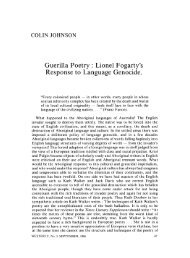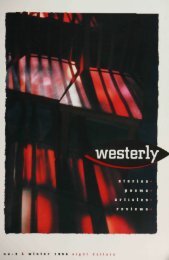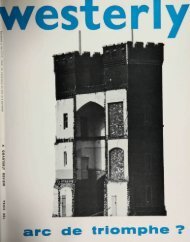well her students did, she was never made a senior teacher. Finally, when shecomplained, the Head told her that she should have stayed in the tea gardens."The tea gardens - is that the English equivalent of our rose garden?" askedthe Headmaster.Joan smiled. "Perhaps. My husband was an engineer in the DaIjeeling teagardens."She didn't add details. It all seemed so unreal now: the whist drives and bridgeevenings, tennis parties and moonlight picnics. They were like guests in their ownhouse - with a mali for the garden, a dhobi for the washing, a cook, a sweeperand a house boy. Their son was away at boarding school."I see," said the Headmaster, rising to his feet to show the interview was at anend. "What an exotic background." He had no other questions.So she stayed, grew used to wearing a cardigan in the summer and complainedlike everyone else about the weather. She bought a maisonette, a peculiarly Englisharrangement of half a house with a pocket handkerchief garden. She planted palewatercolour crocus for the spring and showy dahlias for the autumn. She learnedto cut wafer-thin slices of roast beef and cook fat, fluffy Yorkshire puddings forEnglish friends.Joan still remembered how her cook had cried when she told her that she wasleaving for England."The memsahib will starve - she can't cook.""I can learn," Joan replied."The memsahib will die of poisoning.""Poisoning?""The English eat in the street out of newspaper."Many years later Joan still laughed when she saw the English eating fish andchips with their faces bent over the newspaper wrapping, like horses with nosebags.She missed her son and his wife, but they'd chosen to go to Australia. They hadtwo girls whom she'd never seen except in photos of them blowing out birthdaycandles or frowning at the sun.Her son had been one of the young men in the Calcutta police who patrolledthe streets during the Hindu-Muslim riots. When the British left India he wasquestioned about his loyalty and accused of protecting British interests in the strugglefor independence. He received hate mail warning that his name was on a death listof Anglo Indian policemen. He was worried about his wife. Joan tried to persuadehim to come to England with her, but he said he was tired of being caught in acolonial tug of war.When she was due to retire her son urged her to come to Australia for a holiday.She went to the travel agency and came back with brochures of shocking blue skiesand immense twisted trees with sharp narrow leaves turned away from the sun. Therewas a photograph of a tree with spiky red flowers that looked like brushes. Shehad never seen anything like it.She sent the photo to her son to ask what it was. He wrote back with a photoof a "bottlebrush" from his garden.She couldn't imagine having anything as strange and beautiful in her back garden.And then something about the intensity of the colour shocked her into rememberingthe bright berries that grew in Simla. She couldn't recall their name and as she triedand failed to remember she realised that this was the first time she had thoughtabout Simla since she'd left India ...During the war years the school where Joan taught, Entally Convent, had beenevacuated to the foothills of the Himalayas. The Hindus believed that the gods livedin the hill. In summer it seemed natural to share this belief as she heard the coolrush of water or the clear notes of some hand made pipe. But even in summer she24 WESTERLY, No.2, JUNE, 1989
could see across the valleys to the huge masses of ice and snow suspended in thesky. It made the rest of Simla with its toytown houses plastered against the lowerranges of the Himalayas seem unreal.Winters in Simla made Joan uneasy. In the morning she saw the footprints ofwild animals - the deep wide span of bears or the delicate, triangular pads ofcheetahs. At night she could hear the howling of the wolves and in the day monkeysswung low in the trees near the dining hall. These were not cute chimpanzees likethe ones in the Tarzan movies, but huge and muscular with fierce red rumps. Thegirls giggled nervously at the red rumps, but were too afraid to linger as they dashedfrom classrooms to the hall. The mali refused to cut down the trees because themoneys were from the Sacred Temple. In winter the girls prayed to St Francis ofAssisi to protect them.The girls were always bitterly hungry, but it was much worse at winter. Theycomplained to Joan about their small serves of dahl and rice - their permanentdiet. Her own serves were only slightly bigger. She complained to the nuns, whosaid they must all offer up their sufferings.Through the snow grew tempting, fat, red berries. They were poisonous. One ofthe girls was too hungry to care and ate the berries. She died of lockjaw.Joan lost her appetite. She gave away most of her dahl and rice to the girls onher table. It didn't go very far. She allowed the girls to shake and eat the fruit fromthe tamarind tree in the nuns' garden when it was time for nature walks. MotherSuperior called Joan into the office and assured her that it was not her fault, butrather God's will. She suggested that Joan was too young for such responsibility.She insisted that Joan take a holiday. So Joan went to visit her cousin in theDarjeeling tea gardens, where she met her husband. She never returned to Simla.When she'd tried to talk about her life at Simla with her husband, he would tumhis head to one side and look as if he were listening. But before she could finishhe would stop her by saying. "That's allover now. Why make yourself unhappyby remembering the past?"Just as she couldn't speak of Simla to her husband, so she rarely spoke of herlife in the tea gardens after her husband died. And in England, where there wereso many foreigners, it took too long to explain why she had an English name butwas dark, or why she spoke good English but came from India.* * *When Joan retired she found herself thinking, not of the plans she'd made -the reading group, or drama club or walking tour of the Lake district but of thelives she contained within herself. She had hardly been aware of her first life -she thought she understood Anglo Indians because she was an Anglo Indian. Shethought she understood India because she'd lived there. Her second life was reallyjust a reaction to the first. She'd chosen to come to England because she taughtthe girls at Entally Convent the names and dates of English Kings and Queens aMread to them from Wind in the Willows or David Copperfield.Now perhaps, Joan thought, she had been given a third life. She wanted to findher own India, not the reported India of news stories or documentaries.Joan began to jot down what she remembered of her days in India, asking oldfriends to fill in the blanks, sifting through letters and photos for the rest. She founda photo of a couple at a tennis party. It took her a few moments to recognize herhusband and herself. It might have been a photo of anyone of their friends - AngloIndians playing English games in clothes copied from English magazines, like minorplayers in some colonial tableau.But as she talked to her friends and friends of friends, her story and memorybecame only one of many. What did it mean to say that Anglo Indians were neitherWESTERLY, No.2, JUNE, 1989 25
- Page 3 and 4: CONTENTSWESTERLYVOLUME 34, No.2, JU
- Page 5: WESTERLYa quarterly reviewISSN 0043
- Page 8 and 9: JAN KEMPTo My Father, M.H.K.My fath
- Page 10 and 11: JAN KEMPThe GypsySuddenly before yo
- Page 12 and 13: WONG PHUI NAMA Death in the WardThe
- Page 14 and 15: WONG PHUI NAMCousinI had to call to
- Page 16 and 17: WONG PHUI NAMObitIt is as thin smok
- Page 18 and 19: So thus I lie here fearful of movem
- Page 20 and 21: VIRGINIA BERNARDA ValedictionWhen N
- Page 22 and 23: "Yeah, yeah," I call, returning the
- Page 24 and 25: she flops for a bit, slurps her tea
- Page 28 and 29: English or Indian, that they had th
- Page 30 and 31: ANDREW TAYLORSpringSpring is a dive
- Page 32 and 33: CAROL SElTZERAiming for the MouthTr
- Page 34 and 35: GRAEME WILSONA Selection of Japanes
- Page 36 and 37: a highly ambivalent attitude to his
- Page 38 and 39: Esson attended some rehearsals of T
- Page 40 and 41: the literary life of Bloomsbury. Lo
- Page 42 and 43: Without Yeats Esson would quite lik
- Page 44 and 45: "What theatre do you have in Austra
- Page 46 and 47: In the back room Esson could feel t
- Page 48 and 49: "When we started our little theatre
- Page 50 and 51: a screen against a wall. A theatre
- Page 52 and 53: VINCENT O'SULLIVANSinging Mastery:
- Page 54 and 55: flighty relation in most statements
- Page 56 and 57: living and the dead; that places hi
- Page 58 and 59: quite diverse traditions towards th
- Page 60 and 61: WARRICK WYNNEThe Wetlands (for Liam
- Page 62 and 63: JAN OWENSmileOur mother aimed the b
- Page 64 and 65: RICHARD KELLY TIPPINGOlympic Airway
- Page 66 and 67: DAVID REITERBear by the Jasper Road
- Page 68 and 69: (At twenty eight you did not bother
- Page 70 and 71: left, would have risen and walked o
- Page 72 and 73: He had hair like mine used to be, t
- Page 74 and 75: OLIVE PELLThe QuestionTell me how t
- Page 76 and 77:
BRIAN MOONANAT 515: MASS LECTURE Th
- Page 78 and 79:
PETER KIRKPATRICKTear HereThe bay i
- Page 80 and 81:
JOHN WINTERThe Bird ManIn wooded, p
- Page 82 and 83:
KNUTE SKINNERAugust 15There's a lig
- Page 84 and 85:
M.E. PATTI WALKERThe Hook"Aren't yo
- Page 86 and 87:
QMNQMNQMNQMNapartheid man, this is
- Page 88 and 89:
QMNQMNQMNeasy because you don't bel
- Page 90 and 91:
lands or which have been taken over
- Page 92 and 93:
GEOFF GOODFELLOWToo MuchDianne is 1
- Page 94 and 95:
SHANE McCAULEYSouth Fremantle, Summ
- Page 96 and 97:
JEAN KENTWaiting Out the DroughtWai
- Page 98 and 99:
STEPHEN MAGEEJesus Falls, South Aus
- Page 100 and 101:
SIMON BROWNBlue Hole, Santothe colo
- Page 102 and 103:
CONAL FITZPATRICKA Brown Dog, Off A
- Page 104 and 105:
PAUL HETHERINGTONOne RoomIn teeming
- Page 106 and 107:
society, or, in the terms of the my
- Page 108 and 109:
emphasised (I think) in the referen
- Page 110 and 111:
Summer Leaves". This continues the
- Page 112 and 113:
Deficiency Bill in Western Australi
- Page 114 and 115:
invocation of pastoral near the beg
- Page 116 and 117:
particularly dreaded). The final re
- Page 118 and 119:
VINCENT O'SULLIVAN - is one of New







